 By Ray Rivers
By Ray Rivers
October 23rd, 2017
BURLINGTON, ON
Except for the provincial Liberal government nobody seems to like Quebec’s new law Bill 62, banning face coverings for those seeking or providing public services. The rest of the country is either muted, reserved or pointedly critical. Most people think the law is racist since it will largely target one group of Quebec residents – Muslim women who wear some kind of veil to cover their faces. And that certainly fits at least one of the definitions of racism.
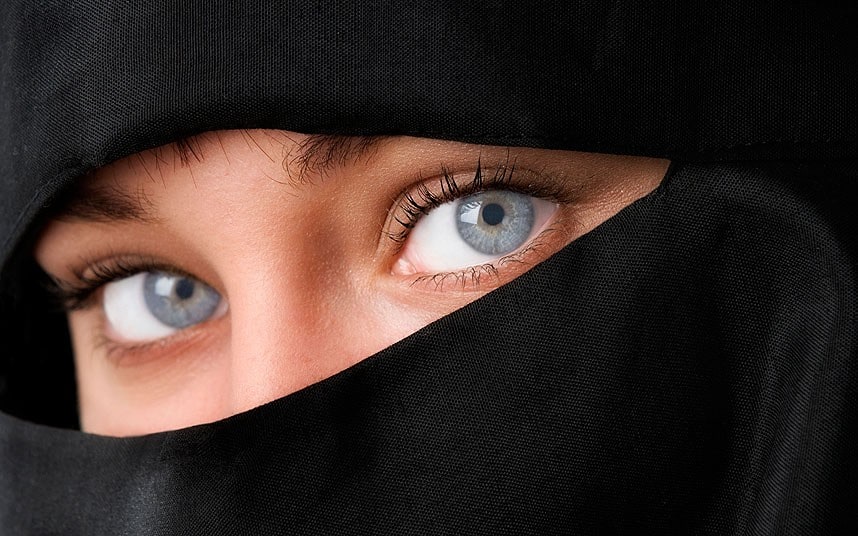
Is it a fashion statement or a religious statement? Is a deeper understanding what will remove the fear?
The burka, or more generally the niqab, is not properly a part of Islam and not even mentioned in the Quran. It is a cultural artifact at best. And not all Muslims wear the face veil, even among those within the same Islamic religious order. It is ironic, though, that while women in Quebec are being legislated to leave their face veils at home, females in Iran are beaten and imprisoned for doing exactly that.
The two opposition parties in Quebec’s legislative assembly think the law hasn’t gone far enough. They’d ban all religious paraphernalia, like crosses, the Jewish yarmulke , and even turbans, including one like the newly elected leader of the NDP, Mr. Singh wears. Of course that would make campaigning a bit of a problem for him in the very province where the NDP did so well only a few years ago. Though if all religions are equally affected by the law, one could argue it is less racist.
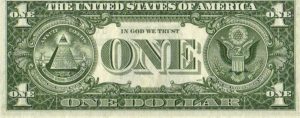
In God We Trust is printed on all American currency.
The Americans have it in their constitution so Canadians think we do as well – the separation of church and state. But if so, why then is ‘In God We Trust” on their money and why do we have God in our national anthem? Indeed religion has always played a role in our political history, even before the Europeans migrated here. But how far should the state venture in managing how people carry out their faith?
There is an argument that someone applying for a drivers license or passport needs to show her face – to ensure she is who she says she is. Mr. Harper felt that principle extended to citizenship services, to be sure the new Canadian is actually saying her oath to the country. And one can only wonder at how effective a veiled woman might be trying to teach a class of young children. But to deny someone wearing a mask to board a bus, seems to be going too far, unless that someone is planning a token robbery.
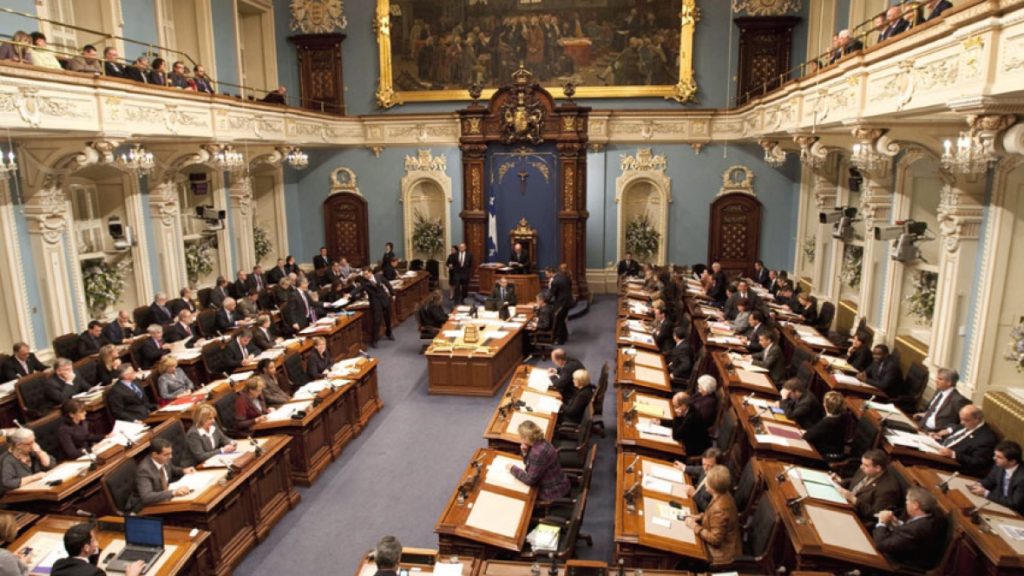
Was the niqab decision made by the government of Quebec a reflection of social values or was it a crass political move to shore up support for the provincial government?
Still, Canada is not officially a religious nation despite the vestiges of the past, like that big cross which hangs in Quebec’s national assembly. Social researchers were speculating barely thirty years ago that houses of worship might one day be relegated to the history books. But that obviously was an inaccurate prognosis. Religion is actually making a come back thanks to immigration.
Back in the day, Pierre Trudeau believed that the best way to deflate Quebec nationalism, and the demand for sovereignty, was to encourage multiculturalism though immigration. But most Quebecers were never big on that policy as one can imagine. Having emerged from literally centuries of being controlled by that other religion, Catholicism, they had been enjoying their liberation until the niqab seemed to threaten the preservation of their own just society – one based on gender equality, aesthetics notwithstanding.
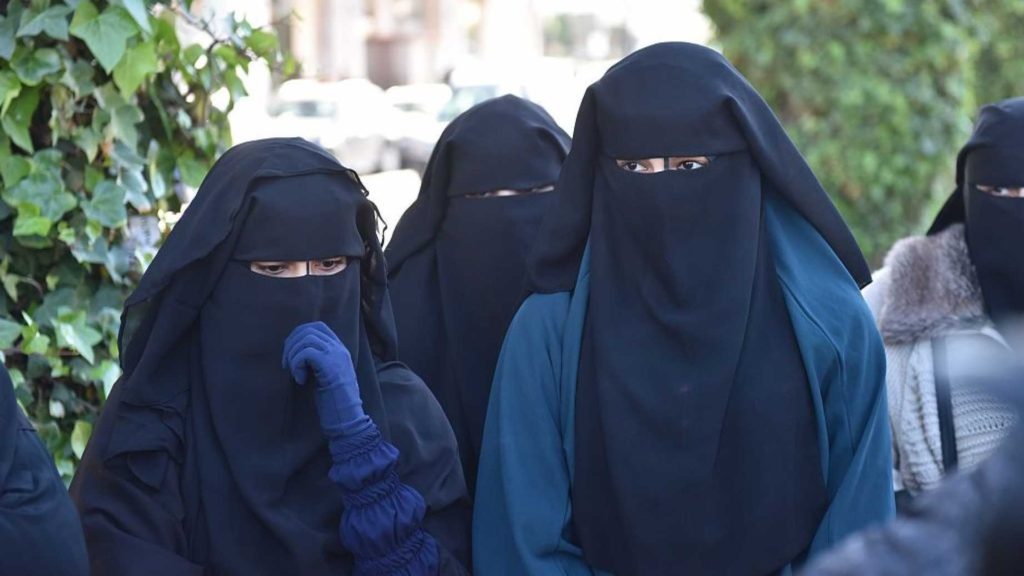
A group of women in their religious clothing.

Nuns in the province of Quebec in their religious clothing.
There will certainly be a challenge through the courts including the Supreme Court, and if the Liberals are still in power in that province by the time this law is declared to violate human rights, Premier Couillard may have to use the notwithstanding clause – or he may fix it in some way. But this issue is not going away and it is unhelpful for other provinces like Alberta and Ontario to chip in from the sidelines, fomenting potential inter-provincial animosity.
It is worth noting that since 2011 France has executed an even more extensive law, banning the wearing of face coverings in all public places, including streets and parks. The new law, Bill 62, may be racist, but Quebecers are not – they are just trying to conserve their own culture from something they don’t fully understand. Despite our PM’s more recent comments on this file, he’d be well advised to leave it alone. This is a matter that needs to be resolved in Quebec by all Quebecers, including those impacted by the law.
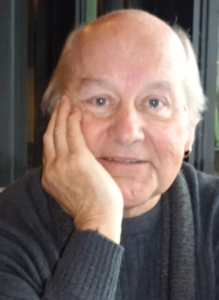 Ray Rivers writes weekly on both federal and provincial politics, applying his more than 25 years as a federal bureaucrat to his thinking. Rivers was a candidate for provincial office in Burlington in 1995. He was the founder of the Burlington citizen committee on sustainability at a time when climate warming was a hotly debated subject. Tweet @rayzrivers
Ray Rivers writes weekly on both federal and provincial politics, applying his more than 25 years as a federal bureaucrat to his thinking. Rivers was a candidate for provincial office in Burlington in 1995. He was the founder of the Burlington citizen committee on sustainability at a time when climate warming was a hotly debated subject. Tweet @rayzrivers
Background links:
Burka Bill – Religious Neutrality – Separation of Church and State –
What Canadians Believe – Feds on Religion Law – Ontario Reaction –
Burka in Quran – Who wears a Niqab –



















We have been hearing about Muslim wearing bans which are definitely heartbreaking. Muslim females do not like to compromise regarding their clothes. Anyway it seems like they are not against Muslim wearing they are actually against Islam.
If you chose to be sub-servant to your male partner, have at it. There is no religious connection to this type of clothing. I am surprised more woman groups aren’t more vocal but I guess they pick their fights accordingly. My main concern is safety. I have seen a few drivers wearing the complete face covering treatment so my question is how can the driver have any peripheral vision? Is she a safety hazard on the road?
As a Christian who fled from a society that was becoming increasingly subservient to the ‘ Wahabi’ interpretation of Islam I have a different take on this. Anyone who wishes to understand the issues better should take a look at the recent C C documentary on the situation in Indonesia, where this harsh view of the world is being imposed on women in particular.
I am very much in favour of the open nature of our society, and what we have done for the Syrian refugees is an example to the world. However let’s not ignore the realities of a world view that is diametrically opposed to western liberal ideas, demands the right to impose their own interpretation of what is not actually a religious item but gives nothing in return. Those that want to champion the burqa also support death for Apostacy, punishment of women who have been raped and other atrocities.
I remember in Iran (1979) when hundreds of thousands or woman took to the streets and tired to stop the Islamic government that had just taken over, and was going to make “modesty” for them, a law. You don’t hear much from them anymore. Their voices long since silenced.
Hans makes a good point. The rationale was never clearly articulated.
That being said the Trudeau government is really boxed into a corner on this legislation. If the PM speaks out against the legislation he risks alienating the Quebec wing of his Party and many Quebec voters who actually support it. If he does nothing he risks alienating those who believe the legislation violates individual liberties and human rights. The best thing the federal Liberals can hope for is a legal challenge under the Charter of Human Rights. The Supreme Court will likely then declare it invalid which will bolster separatists in the province.
Well done. You rightly point out the current issues in the United States. Yet, I’m uncomfortable with what I see as the possible conflation of race and religion. It’s hard to see such a ban as racist.
It is also necessary to note that, largely in reaction to the Ku Klux Klan, the U.S. did ban facial coverings for many years. What happened to that ban, I don’t know. I agree that faces must be uncovered for legal interactions such as driver’s license, etc.
I had many Muslim students in my college classrooms. Rarely did I see a full facial covering. But, when it did happen it was not at all disruptive. As you know, I lived and traveled in Muslim countries. The only places I saw a burka or other facial covering was in the cities; in the country or desert I saw no such thing.
I do agree Quebec must settle this for themselves, but if their decision runs contrary to the rest of Canada does that not foment even greater separatism?
Hans – thanks for your contribution. I agree though the law’s title is – “Bill n°62 : An Act to foster adherence to State religious neutrality and, in particular, to provide a framework for requests for accommodations on religious grounds in certain bodies”, which means the preoccupation was with religion.
https://www.assnat.qc.ca/en/travaux-parlementaires/projets-loi/projet-loi-62-41-1.html
I fully concur with the ban. One should always know with whom one is interacting and be able to subsequently identify the person, if necessary. As you stated, there is no direction in the Quran requiring such dress code. This is done, in my opinion, to satisfy the demands of husbands or fathers who believe that by showing her face, a woman is granting some intimate privilege to strangers. Also, without this ban, what is to stop anti-social males (such as criminals) from covering their faces, too?
IMO the rationale for the law was inadequately articulated. There are valid reasons for requiring uncovered faces; e.g., identifying drivers at an accident scene, or allowing airport facial recognition systems to identify travelers.